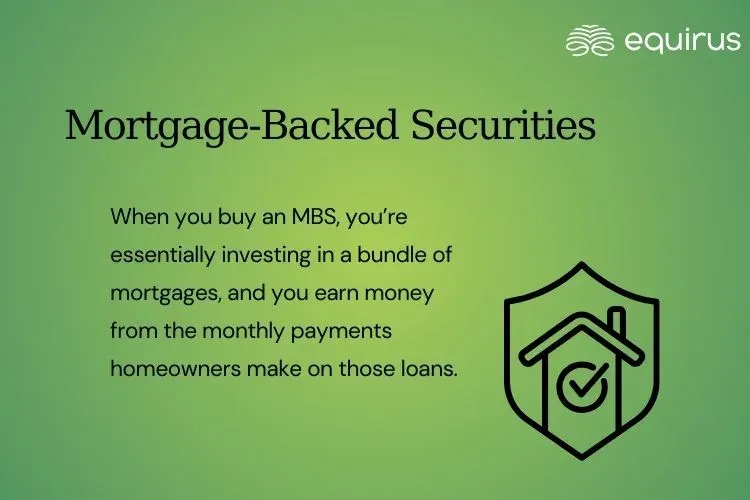Mortgage-Backed Securities (MBS)

Key Highlights
-
When you buy an MBS, you’re essentially investing in a bundle of mortgages, and you earn money from the monthly payments homeowners make on those loans.
-
Types of MBS include pass-through securities, collateralized mortgage obligations and stripped MBS.
What is Mortgage-Backed Securities?
Think of MBS as investment packages, like bonds, that are built from a collection of home loans. When you buy an MBS, you’re essentially investing in a bundle of mortgages, and you earn money from the monthly payments homeowners make on those loans.
How They Work?
Banks or financial companies group lots of individual home loans together and sell them as one investment product. The money homeowners pay each month (both the loan principal and interest) gets passed on to you, the investor, as regular income.
Types of MBS
-
Pass-through securities: You get a share of the homeowners’ payments directly.
-
Collateralized Mortgage Obligations (CMOs): Payments are split into different “slices” with varying levels of risk and reward.
-
Stripped MBS: Payments are divided into separate streams—one for the principal and one for the interest—so investors can pick what suits them.
Pros of Investing in Mortgage-Backed Securities (MBS)
-
Steady Income: MBS provide regular payments from homeowners’ mortgage payments, offering a reliable income stream, like clockwork.
-
Diversification: They let you invest in real estate without owning property, spreading your risk across many mortgages.
-
Government Backing (for Agency MBS): Many MBS, especially from government agencies or government-sponsored enterprises, come with guarantees, making them safer bets.
-
Variety of Options: With different types (pass-throughs, CMOs, stripped MBS), you can pick investments that match your risk tolerance and goals.
-
Higher Yields: Compared to some bonds, MBS often offer better returns, especially for risk-tolerant investors.
Cons of Investing in Mortgage-Backed Securities (MBS)
-
Interest Rate Risk: If interest rates rise, MBS values can drop, and you might get lower returns or lose money if you sell early.
-
Prepayment Risk: Homeowners might pay off their mortgages early (e.g., by refinancing), cutting off your expected income sooner than planned.
-
Credit Risk (for Non-Agency MBS): Private MBS without government backing can be riskier if homeowners default on their loans.
-
Complexity: MBS can be tricky to understand, especially CMOs with their layered risk levels, which might confuse less experienced investors.
-
Market Volatility: Economic shifts, like housing market slumps, can affect MBS performance, impacting your investment’s value.
